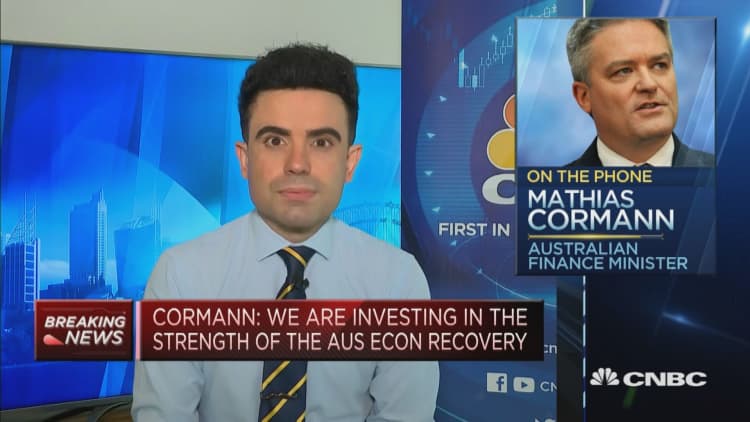
SINGAPORE — After providing initial support for an economy reeling from the coronavirus pandemic, the Australian government is now focusing on the strength of recovery, Finance Minister Mathias Cormann told CNBC on Wednesday.
The government announced its budget a day earlier including billions of dollars' worth of personal tax cuts for middle-income earners, programs to create jobs and boost employment as well as temporary tax incentives for businesses to start investing again. Australia's budget deficit is predicted to be 213.7 billion Australian dollars ($151.8 billion), about 11% of GDP, in the current fiscal year and is expected to reduce to about 1.6% of GDP in the medium term.
"Having provided the initial crisis support to cushion the blow on the economy, on jobs and on working families, what we're doing now is invest in the strength of our economic recovery moving forward," Cormann told CNBC's "Squawk Box Asia."
"Yes, it is a sizeable deficit in an Australian context, but we went into this crisis in a comparatively stronger fiscal position," he said, adding that even after the planned expenditure and fiscal support measures announced, Australia's debt position as a share of GDP remains substantially lower than other advanced economies.
When asked if businesses, as they face global uncertainties, would take up the government's offer and kickstart their investment process, Cormann was optimistic. He said Australia's economic fundamentals were strong before the pandemic hit and that the country is in Asia Pacific, a part of the world that is set to generate most of the global economic growth in decades to come.
"We are [an] internationally competitive, open, trading economy and we are providing incentives through the tax system in a way that is time limited in order to really trigger those decisions by business to bring any investment decisions forward, to invest in the future growth and success," he said.
One of the measures includes an instant asset write off for firms with turnover of less than 5 billion Australian dollars, which comprises about 99% of businesses.
"In the end, we all want more jobs, but jobs don't grow on trees, they are created by profitable growing businesses and that is why we want businesses to invest in their future growth and success right now," Cormann added. He also said the government expects to recoup the money provided in the budget over the medium term through higher taxable profits and incomes.
In the budget measures announced, Australia is set to provide 4 billion Australian dollars over three years to speed up employment growth. The government will pay companies up to A$200 per week if they hire young Australians, whose employment prospects have been hit by the recession.
Analysts at the National Australia Bank said while there was no problem with the government's focus on getting the economy going using fiscal stimulus, "structural reform would have also been useful." They added that the issue of future debt is of little near-term concern as the economy "needs all the help it can get from fiscal policy."
Interest rates are already at a record low of 0.25% and while the Reserve Bank of Australia may fractionally lower rates, that would have marginal impact at present, according to the NAB analysts. "The cost of credit is not the issue – rather it is the lack of demand for credit."


